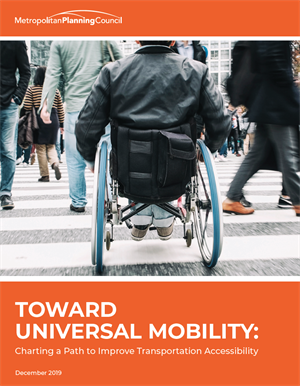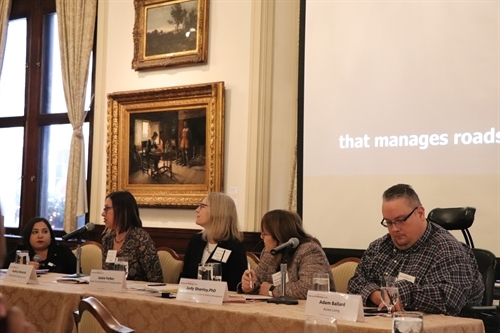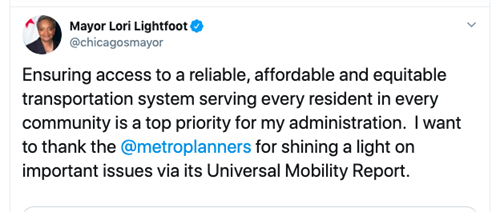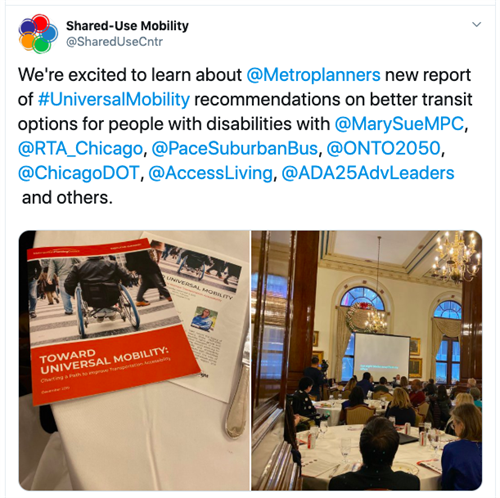Days after the launch of a new MPC report, here's what you need to know about the conversation, online and in person.


On December 3rd, after more than a year of research and interviews, MPC released a new report focused on building a better transportation system for people with disabilities in the Chicago region: Toward Universal Mobility: Charting a Path to Improve Transportation Accessibility. As part of the release MPC held a lively panel discussion on mobility for people with disabilities at the Union League Club, which was attended by 150 advocates, transportation providers, elected officials and experts. Risa Rifkind of ADA 25 Advancing Leadership, a member network of over 115 powerful local leaders with disabilities, moderated the panel. Adam Ballard of Access Living shared his perspective as a lifelong disability advocate and policy expert. Jackie Forbes of Kane County Division of Transportation spoke about her experience managing Kane County's coordinated Dial-a-Ride system. Judy Shanley of Easterseals and the National Center for Mobility Management provided a national perspective on policies and best practices in mobility management. Finally, MPC's Audrey Wennink tied the conversation back to the report's 32 recommendations.
The full report is available now on MPC's website.
If you weren't able to make it, you can watch the entire event below.
In the meantime, we wanted to share some of our favorite moments from the day:
Universal mobility goes far beyond accessible transit, and considers the entire transportation system as a whole.
"From sidewalks to signs to online information, we need to be better at thinking about the transportation experience from the user perspective. We arrived at the term universal mobility for the report based on the belief that mobility is a human right, and that access to high quality accessible transportation for people of all ages and disabilities is fundamental to accessing that right." - Audrey Wennink
Successful cities around the country have three fundamental things in common: innovation, integration and inclusion.
"When I think about cities that are touted as models, I think of three things. They're not afraid to explore new options and test new ways of providing service. They're innovative. They're building an integrated framework by bringing on new and different partners, both public and private, and working across varying agencies. And then finally, they're inclusive. Individuals with disabilities are at the table in planning, operations and evaluation." - Judy Shanley

From L to R: Risa Rifkind, Audrey Wennink, Jackie Forbes, Judy Shanley, and Adam Ballard
Fragmentation across arbitrary borders can create very brittle and confusing services that don't align with how people live their lives.
"One of the real troubles we have is when people move. Say someone moves from the municipality of St. Charles to the township of St. Charles. The municipality and the township actually have two different types of mobility services. Customers from the township will call and ask why one service doesn't operate for them, and we'll explain the different service areas. And they say, 'what are you talking about? I live in St. Charles.' Well, you actually don't." - Jackie Forbes
The data we've collected is an indicator of our collective priorities.
"Until this year, we did not have a database of where all the sidewalks were in this region. We had data on where the highways were, but we only just now have data on sidewalks because CMAP collected the data from aerial photography. That does not include ADA aspects [such as curb cuts and crosswalks]. So it's a great base, but now we need to add details about where the ADA compliant elements are." - Audrey Wennink

It was a full house at the Union League Club.
To design a universally accessible service, it's essential to bring people with disabilities to the table from the beginning.
"Some of the private-public partnerships we know about are working very well and haven't had problems. Some of them are working really poorly. From where we can see the differences, those processes that include [people with disabilities] from the very beginning work well, and those where we're consulted after the fact, after the deal has been done or after the ink is dry, that's when the problems come up. So bring us into the process from the beginning, when you're designing, when you're figuring out what that partnership is going to look like." - Adam Ballard
Universal mobility is an essential part of building resilient, multi-generational communities.
"I think a lot about how we make resilient, competitive and enduring multi-generational communities where people can age in place. Many elected officials I understand are hearing a lot of things from their residents more and more recently. The Metropolitan Mayors Caucus has started an aging in place committee, which is reflective of the urgency of this issue, so I think we need to stop viewing this as a marginalized problem, but a central problem to our communities' health and sustainability." - Audrey Wennink
We have the technical ability to build a better system. What we need is the right representation.
"There's no reason why we can't get it right this time, why we can't design transportation systems that are seamless for literally everyone. The only thing that would stop this is if we don't have the right voices at the table. We don't have the right people involved in the decision making. That means, again, we need to share power with each other." - Adam Ballard

State Senator Dan McConchie, joined by MPC senior advisor Nancy Firfer, was one of numerous elected officials in attendance.
To do it right, we have to dedicate the right resources.
"I think the key part of the regional mobility coordinator is to make it a full-time position. A lot of people already doing this work - and my colleagues in the other counties - this is just a small portion of our job. We can't dedicate enough time to it to try to expand our services." - Jackie Forbes
We had a robust Twitter conversation during and after the event. You can still join in by using the hashtag #UniversalMobility.


Toward Universal Mobility is recieving a lot of attention in the press, revealing the broad interest this topic is generating.
Mary Wisniewski: "If you're disabled, accessing transit can be like solving a puzzle with a lot of missing pieces"
Manny Ramos: "Public transportation services for people with disabilities must get better, MPC says”
Marni Pyke: “Report paints dire picture of services for disabled and elderly transit riders”
Greg Hinz: "Report urges big upgrade in public transit service for the disabled, seniors”
Kristen Thometz: "Report: Local Transit Fails to Meet Needs of Disabled, Elderly Riders"
Natalie Moore: "Report: Fragmented Transit System Shortchanges Some In Chicago Region"
At MPC, we believe that mobility is a human right. Universal mobility is something we all have a stake in, because we will all experience limited mobility at some point in our lives, either personally or as a caregiver. Stay tuned to learn more about our report's recommendations, and to meet some of the fascinating people we met along the way.
MPC thanks our Toward Universal Mobility report sponsors, Transdev.

MPC also thanks our Toward Universal Mobility event sponsors, Wight & Company.
